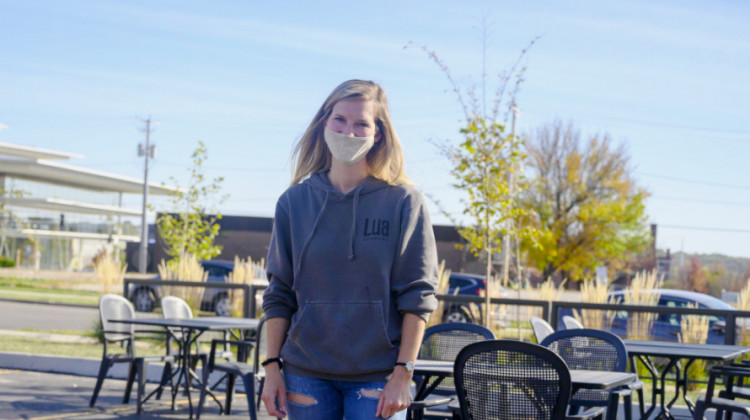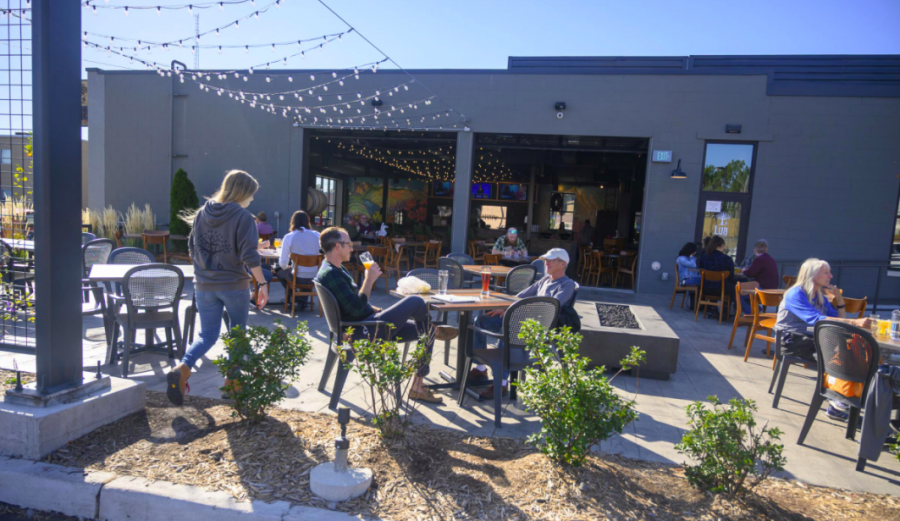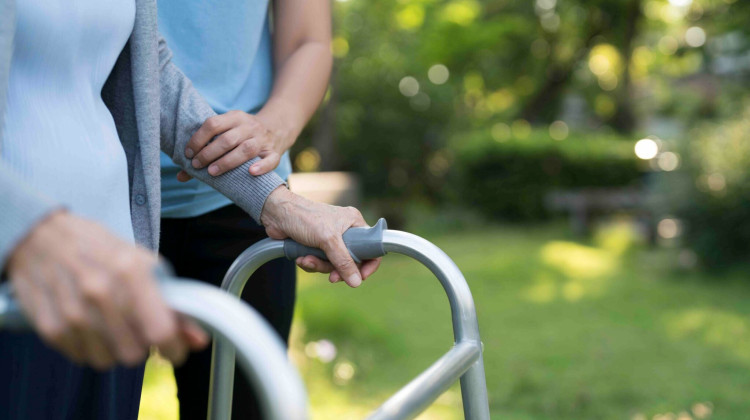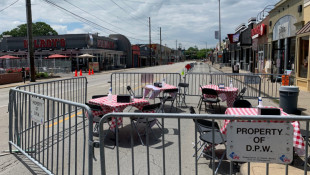
Whitney Selix, the owner of Lua Brewery in Des Moines, says the business she started with her husband has survived the pandemic thanks in part to a large patio area.
Natalie Krebs/Side Effects Public MediaParts of the Midwest have already seen snow, and with this winter weather comes an added layer of challenges for battling COVID-19.
Whitney Selix and her husband opened Lua Brewery in Des Moines, Iowa, a year ago. It’s a spot where you can get a glass of Call It Dreaming or Chronically Late.
So far, Lua is surviving the pandemic.
That’s thanks in part to the way they designed it. By opening a set of garage doors, the indoor dining area connects to a large patio. So customers can enjoy drinks outdoors in the crisp fall weather, spaced far apart.
"The garage doors were always part of the plan, and we are so thankful that ... they are at this point because I think it makes people feel a lot safer. You know, having that open airflow," she says.
But Selix worries about maintaining this business in winter. In the era of COVID-19, she knows closing those doors and cramming in people wall to wall — like they did last year — is not an option.
"I’m nervous for sure," she said. "I mean we're, you know, drastically cutting back on costs, just in preparation for a slower season."
Selix isn’t the only business owner concerned about what will happen when COVID-19 meets the Midwestern winter.
Meg Schneider, senior vice president of business resources and community development at the Greater Des Moines Partnership, says the economic development group used grants to provide heaters to more than 60 local businesses so they can extend patio season.
Schneider says the holiday rush during November and December is crucial to a business’ bottom line. "If these months that usually help round out a solid year of business and help you through those slower months, if those months are slower as well, I fear that we will end up losing additional businesses come January, February."
That’s a problem because public health models predict November and December are when the coronavirus will thrive. With daily case counts and deaths increasing nationwide.
Ali Mokdad, an epidemiologist at the University of Washington, says the cold weather will drive people indoors where the virus can easily spread.
"What we have seen is people are more likely to let down their guard indoors," he says. "They take off their mask and they become closer to each other."

Iowa and many parts of the Midwest are already in a vulnerable position. Daily case counts have been trending upward for weeks. Hospitalizations are at record highs, and public health experts are urging state leaders to take action.
But Iowa Gov. Kim Reynolds has no plans to issue additional restrictions. Earlier this month, she said the state’s healthcare system can handle more cases.
"We've not approached the peak of our hospital capacity, our health, our health care system in Iowa is strong, and for that we are grateful," she said.
Brent Willet, the president of the Iowa Health Care Association, which represents most of the state's nursing homes, says people in nursing homes will be relying on the strength of that system.
Those homes already have been hard hit by COVID, and he says it will be impossible to keep the virus out of facilities this winter.
"We need to be extraordinarily vigilant about infection control in the building," he says. "And we need to be extraordinarily vigilant about screening anyone that's gaining access into the building for any reason."
Mokdad says everyone needs to be really careful about who they see this winter. "Unfortunately, this virus is very stubborn, very opportunistic. If we make a mistake, this virus is going to, you know, win and start spreading."
He says this doesn’t mean family holiday parties should be cancelled. But participants will need to quarantine 14 days ahead of time, and he said those with severe quarantine fatigue can create a social bubble with a few close friends.
Whitney Selix hopes Iowans can adapt to some European habits — like using patios year round.
"They're always out there, they'll cover up in blankets and they'll be bundled," she says. "And they'll just smoke their cigarettes and drink their wine and beer. And I think it's awesome."
Selix says that’s the only way her brewery will get through the tough winter months.
This story was produced by Side Effects Public Media, a news collaborative covering public health.
 DONATE
DONATE





 View More Articles
View More Articles

 Support WFYI. We can't do it without you.
Support WFYI. We can't do it without you.